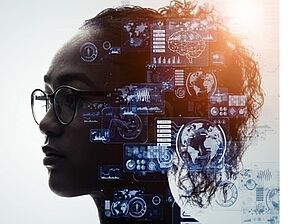How does direct interaction with the brain work? The brain consists of a multitude of small nerve cells, so-called neurones. These neurones trigger a firework of electrical impulses with every subtle perception or thought. Even if these impulses are very weak, they can be measured with the help of sensitive sensors or even imitated by electrodes. These devices can be summarised under the term neurotechnologies. Does this make humans part of the machine?
Neurotechnologies are devices that can directly access, observe, analyse, change or stimulate the human nervous system. These technologies promise significant improvements for people with diseases such as Parkinson's and Alzheimer's as well as mental illnesses or in stroke rehabilitation. However, in addition to medical applications, there are also visions of enhancing human abilities, expanding consciousness and even merging mind and machine.
The prospect of enhancing human capabilities beyond natural limits raises critical questions. The long-term effects are unknown and the dangers of potentially discriminatory or abusive use of these technologies are great. Questions arise about the ownership of neural data, the potential for surveillance, commercial manipulation or political influence, as well as equality, inclusion and access, and even the very definition of what it means to be human. The topic emphasises the need for a broad-based social discourse
In the future dialogue Re-Engineering Human Nature, these and other critical points will be discussed with an interested audience and invited experts on two panels. The first panel will focus on human rights, ethics and the safety of neurotechnologies. This will be followed by film screenings to provide impetus for the second panel on the topic of myths and visions of neurotechnologies. With experts from various disciplines, we offer a comprehensive insight into this ambivalent technology and discuss new opportunities, potential challenges and the role of art in this socially relevant area of technology. The event is a collaboration between the Austrian Institute of Technology (AIT), the Ars Electronica NeuroExperience Lab, the Federal Ministry for European and Foreign Affairs (BMEIA) and the University of Art and Design Linz.
Programme
Saturday, 26.April 2025, 15:00 - 20:00
SKY, Ars Electronica Center 3.Floor, Ars Electronica Str. 1, 4040 Linz
Moderation: Wenzel Mehnert (AIT) & Claudia Reinprecht (BMEIA)
Admission is free; please register here
15:00 Admission
15:30 Start,
Welcome Wenzel Mehnert (AIT) and Erika Mondria NeuroExperience Lab (AEC)
16:00 Introduction to the topic of brain interaction and myths and visions of neurotechnologies
Key Note: Guilherme Maia de Oliveira Wood (University of Graz)
16:30 Panel 1: Human rights, ethics and security of neurotechnologies
Keynote speeches by Elisabeth Staudegger (University of Graz); Daniel Hikes-Wurm (BMLV); Eugen Dolezal (University of Vienna)
17:00 Dialogue with the audience
17:45 Break
18:00 Film screening of short films on neurotechnologies
18:45 Panel 2: ‘Myths and visions of neurotechnologies’
Keynote speeches by Erika Mondria (artist); Alexander Lechner (g.tec); Thomas Stieglitz (University of Freiburg)
19:15 Dialogue with the audience
20:00 Open discussion with drinks and snacks in the lounge
Gäste
Prof. Dr Guilherme Maia de Oliveira Wood, Professor for Neuropsychology at the Institute of Psychology at the University of Graz
Prof. Dr. Elisabeth Staudegger, Professor at the Faculty of Law at the University of Graz and Head of the Department ‘Law and IT’ and Fellow Professor of IT Law and Standardisation at IT:U.
Eugen Dolezal is a university assistant at the Department of Social Ethics at the University of Vienna.
Colonel Daniel Hikes-Wurm, MA works at the Federal Ministry of Defence analysing and evaluating the security and defence policy implications of new technologies.
Prof Dr Thomas Stieglitz, Professor of Biomedical Microtechnology at the Department of Microsystems Engineering (IMTEK) at the University of Freiburg.
Alexander Lechner, MSc. is Partner Relations Manager at g.tec medical
engineering GmbH, a leading company in the development of neurotechnologies and brain-computer interfaces based in Austria.
Erika Mondria is a NEURO Artist, mental coach and supervisor for BrainProjects. She develops participative brain installations that make neurophysiological processes tangible.
With this event, the AIT Austrian Institute of Technology is continuing a series of future-oriented dialogues on transformation topics with an impact on Austria's economy, society and politics that began in 2024. They are based on the broad spectrum of international and European work on foresight and transformative innovation policy carried out at the AIT's Centre for Innovation Systems and Policy. With four foresight briefs and associated workshops, 2024 marked the start of a programme of foresight events in, with and for Austria over the next three years.
This event is also part of the BMEIA's #TechDiplomacy programme. Building on Austria's traditional foreign policy priorities of the primacy of international law,
especially international humanitarian law and human rights, it serves to categorise new disruptive technologies in terms of foreign policy. At the interface of foreign policy, technology and innovation, Austria's #TechDiplomacy aims to achieve added value beyond the traditional approaches of foreign policy in order to raise Austria's profile as a trustworthy partner in multilateral global governance on the one hand and to contribute to strengthening Austria as a centre of technology and innovation on the other.



